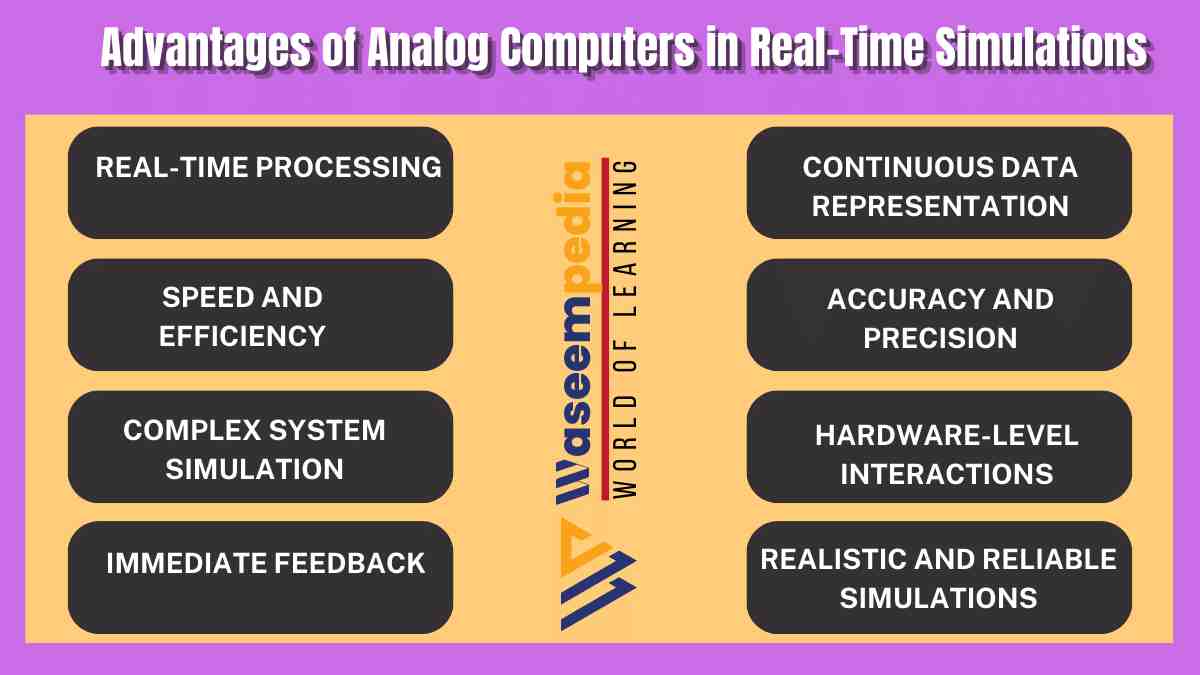Analog computers having advantages in real-time simulations, such as real-time processing, continuous data representation, speed, efficiency, accuracy, and precision. Their ability to handle complex systems, interact with physical hardware, and provide immediate feedback makes them ideal for real-time simulation applications.
While digital computers have become ubiquitous, analog computers continue to play a vital role in domains that require real-time interactions and continuous data processing. The unique advantages offered by analog computers contribute to more realistic, reliable, and efficient real-time simulations. In this article, we will explore the advantages of analog computers in real-time simulations, highlighting their relevance and benefits in this critical domain.
what is Analog Computers?
Analog computers utilize continuous physical quantities, such as voltages or currents, to represent and manipulate data. Unlike digital computers that work with discrete values, analog computers can directly model real-world phenomena with precision. This inherent ability to process continuous data in real-time is what sets analog computers apart and makes them ideal for real-time simulations.
7 Advantages of Analog Computers in Real-Time Simulations
7 Advantages of Analog Computers in Real-Time Simulations are as following
1. Real-Time Processing
one of Advantages of Analog Computers in Real-Time Simulations is Real-time processing.It is a crucial requirement for real-time simulations. Analog computers excel in this domain due to their inherent ability to process continuous data streams with minimal latency.
Unlike digital systems that require complex algorithms and discretization of data, analog computers can immediately react to changes in input, providing real-time feedback and responses. This capability is essential in time-critical applications where immediate reactions are necessary.
2. Continuous Data Representation
Analog computers operate using continuous data representation, allowing them to capture and manipulate the fine-grained details of a phenomenon. In real-time simulations, where accurate and precise modeling is crucial, analog computers shine.
By working with continuous signals, analog computers can maintain the fidelity of the simulation without the need for quantization or discretization. This ability to preserve the analog nature of the data leads to more accurate and realistic real-time simulations.
3. Speed and Efficiency
One of the most important Advantages of Analog Computers in Real-Time Simulations is speed and efficiency. Analog computers are renowned for their speed and efficiency in processing continuous data. Since analog computations occur directly in the analog domain, they can achieve high speeds without the overhead of converting data between analog and digital representations.
This advantage is particularly relevant in real-time simulations, where fast and efficient processing is necessary to provide instantaneous responses. Analog computers can keep up with the dynamic nature of real-time simulations, ensuring smooth and responsive interactions.
4. Accuracy and Precision
Real-time simulations require high levels of accuracy and precision to provide reliable results. Analog computers excel in this aspect due to their ability to represent and manipulate continuous data without discretization errors.
By working with continuous signals, analog computers can faithfully reproduce the behavior of the simulated system, capturing intricate details and subtle changes. The resulting accuracy and precision enhance the realism and reliability of real-time simulations.
5. Complex System Simulation
Real-time simulations often involve complex systems with numerous interconnected variables. Analog computers are well-suited for simulating and analyzing such systems due to their ability to handle intricate relationships and interdependencies.
By leveraging the analog nature of computation, analog computers can simulate complex systems in real-time, providing insights into the system behavior and dynamics. This advantage is particularly valuable in domains such as aerospace and robotics, where accurate real-time simulations are essential for testing and validation.
6. Hardware-Level Interactions
Analog computers can interact directly with physical hardware, making them suitable for simulations involving hardware components. In real-time simulations, this capability enables engineers and researchers to connect analog computers to physical systems and test their behavior in real-time.
By integrating analog computers with hardware interfaces, real-time simulations can provide a realistic environment for analyzing and evaluating the performance of hardware-based systems.
7. Immediate Feedback
Real-time simulations often require immediate feedback to monitor and control the simulated system. Analog computers can provide this immediate feedback due to their real-time processing capabilities.
Engineers and researchers can observe the behavior of the simulated system in real-time, make adjustments, and observe the corresponding changes in the simulation output. This instant feedback loop is essential for real-time simulations, as it enables continuous monitoring, analysis, and adjustment of system parameters.
Related FAQ’s
How do analog computers differ from digital computers in real-time simulations?
Analog computers process continuous data in real-time, while digital computers operate on discrete values and require complex algorithms for real-time processing.
What are the advantages of using analog computers in real-time simulations?
Analog computers excel in real-time processing, continuous data representation, speed, efficiency, accuracy, precision, handling complex systems, interacting with hardware, and providing immediate feedback.
Why is real-time processing crucial in real-time simulations?
Real-time processing ensures immediate responses to changing input, allowing for instantaneous feedback and realistic interactions in the simulation.
How do analog computers handle complex systems in real-time simulations?
Analog computers can accurately model and simulate complex systems, capturing intricate relationships and interdependencies, thereby providing insights into system behavior and dynamics.
What is the significance of immediate feedback in real-time simulations?
Immediate feedback enables continuous monitoring, analysis, and adjustment of system parameters in real-time simulations, leading to better control and evaluation of the simulated system.

